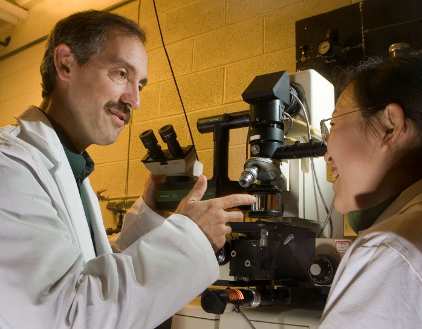
| HOME | SITEMAP | CONTACT US | DIRECTIONS |
| Recent Research |
| Recent Teaching |
| Group Members |

Teaching Interests
Dr. Jones’ teaching interests are based on the philosophy that a curriculum must provide students with relevant, active learning environments, which foster the development of critical thinking and problem solving skills. These skills are crucial both for the scientific researcher when solving chemical problems and for the general population that is increasingly faced with choices on technology, the environment, and the natural world. In chemistry, this can be achieved by combining high quality research with interactive classroom discussions of contemporary scientific problems and theories. As Director of the Center for Learning and Teaching, Dr. Jones' teaching interests concentrate on the effective use and evaluation of technology in the classroom. These teaching interests involve long-term curriculum development in chemistry including more expanded use of technology in introductory chemical education, use of interactive multi-media materials for self-directed learning, and the design of new advanced undergraduate laboratories based on the guided inquiry approach. As PI or Co-PI on several grants from NSF, he has worked with different teams of faculty and graduate students have implemented new advanced laboratories in Inorganic and Materials chemistry, introduced scanning probe microscopies including AFM and STM into the undergraduate curriculum, and created learning activities to introduce nanotechnology to an interdisciplinary group of courses in chemistry, physics, biology, and engineering.
Web based curricula for enhanced learning in both traditional and distance education courses is an additional area of interest. With a combination of support from Houghton Mifflin Inc., Cubic Science Inc., and the SUNY Office of Educational Technology, Dr. Jones and Dr.Dix have created an internet learning environment for general chemistry. This project is currently in use on campuses across the country in combination with two best selling chemistry texts. He has also developed several graduate level courses for chemistry distance education distributed through the SUNY Learning Network including Electrochemical Methods and Techniques for Studying Solids.
| Course | Description | Title |
|---|---|---|
| CHEM 442 CHEM 542 |
Chemical structure and bonding in inorganic systems; symmetry and group theory, and its application to chemical bonding; physical techniques in the study of inorganic systems. | Physical Inorganic Chemistry |
| CHEM 107 | Fundamentals of chemistry, including atomic structure, elementary thermodynamics, kinetic theory of gases, chemical bonding, molecular structure and chemical equilibria. | General Chemistry |
| CHEM 445 | Preparation and characterization of inorganic compounds and materials: solid state and molecular structure, reaction kinetics, spectroscopic methods, photochemistry, catalysis, zeolites, polymers, superconductors and technical writing. Lecture and laboratory. | Inorganic Materials Laboratory |
| CHEM 341 | Relations among structure, energy and reactivity of inorganic systems; transition and non-transition elements. Descriptive chemistry of common elements; chemistry of solid state. | Intermediate Inorganic Chemistry |
| CHEM 443 CHEM 543 |
Introduction to modern molecular photochemistry of organic, inorganic and organometallic systems. Excited states, photophysical processes, energy transfer, electron transfer, substitutional photochemistry, chemiluminescence. | Molecular Photochemistry |
| CHEM 484 CHEM 584 |
Advanced treatment of selected areas of inorganic chemistry. Recent topics include reactivity of solids (inorganic phase equilibria), chemical group theory, spectroscopic methods, x-ray diffraction and electron transfer theory and electrochemistry. | Electrochemistry |
| CHEM 496 | Presentation and discussion of current chemical literature. Includes use of library resources and computer databases of chemical literature. Students present a seminar and a poster on an assigned topic. | Senior Seminar |
| CHEM 592 | Seminar discussion of current research topics. Attendance required of all degree candidates. Credit granted in those semesters student presents seminar report. | Graduate Seminar |

© Department of Chemistry, State University of New York at Binghamton, Binghamton, NY 13902-6000
Updated 04-09-2016